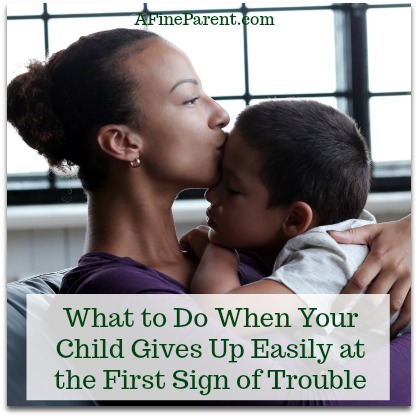 “AAAAAAAAARRRRR!” She roars.
“AAAAAAAAARRRRR!” She roars.
It is her tenth attempt to hit the stupid little white ball into the stupid little hole with the stupid mini-golf club.
And then – wham! – she slams the golf club into the fake turf … and – whoosh! – she throws the golf club into the shrubs. Everyone watches in horror. She stomps off.
This wasn’t the first time and it won’t be the last.
Do you have a child who has trouble managing frustration? Please take comfort in knowing you’re not alone. Many kids (and adults, for that matter) have trouble with frustration, disappointment, and facing challenges.
Before I continue, I want to let you know I understand how it feels to be that child; the one who’s deeply frustrated and acts out. I understand, because I sheepishly admit that I was the girl up there.
I was the one who threw mini-golf clubs.
I had a terrible time managing my emotions when things were hard for me. When the going got tough, I got going – literally.
I would bail in all sorts of ways: I’d fake tummy-aches or “accidentally” fall in races I thought I wouldn’t win. I would quit the card game and stop trying my best any time I could smell failure approaching.
I bailed a lot as a kid because I lacked a way to help myself through challenges, see my way over hurdles, and get myself to the finish line no matter what.
In short, I lacked what we call in today’s parenting lingo “grit” and “resilience.”
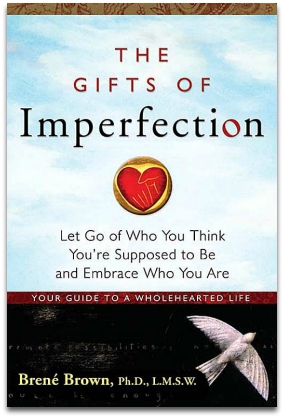 When I became a mom, one of my big goals was to raise my children to be NOT like me in this regard. I had my work cut out for me, because as the wise Brené Brown, author of The Gifts of Imperfection, says, “We cannot give our children what we do not have ourselves.”
When I became a mom, one of my big goals was to raise my children to be NOT like me in this regard. I had my work cut out for me, because as the wise Brené Brown, author of The Gifts of Imperfection, says, “We cannot give our children what we do not have ourselves.”
So, in pursuing my goal to raise gritty and resilient kids, I had to learn what those things meant, then learn to do it for myself, and simultaneously teach it to my children.
I learned some super-valuable things along the way and I’d like to share them with you here. My hope is to help you create an environment in which you and your children can truly thrive.
The Keys to Confidence
Call it grit or resilience or bad-assery, but I think what we’re truly after as parents is confidence.
According to my own goals and what my clients tell me they want, it seems our collective goal is to raise kids who trust themselves, who believe in themselves, and who can face life’s challenges with grace – or at least without throwing the golf clubs and/or giving up.
As a parent educator and parenting coach, I help parents shift their family lives to ones that are calmer and happier. Part of my work involves challenging them to take honest stock of who they are so they can build and pursue what they really want for their families.
I drop a lot of truth bombs in my work – and the truth about confidence is this: As a parent you won’t feel 100% confident 100% of the time. Which is fine. In fact, it’s awesome because it keeps you in growth-mode. The alternative would be stagnation. Stuckness. (Ew.)
The same is true for your children. They won’t always feel confident; that’s OK. Part of our job is to let them know that it is OK.
 Being confident means we’re OK not being confident all the time. (self-acceptance)
Being confident means we’re OK not being confident all the time. (self-acceptance)
Being confident means we keep trying when things get hard. (grit)
Being confident means we are able to bounce back when we stumble. (resilience)
So, the question isn’t, “How do I teach my child to be confident all the time?”
The question is more like, “How can I build my child’s confidence enough so that s/he hangs in there when the going gets tough? How can I help my child build inner-strength?”
We want our kids to have a sturdy foundation, not a shaky false-front. We want them to have that solid, unshakable confidence that comes from three things: self-acceptance, grit, and resilience.
Self-Acceptance
You know that person who makes you feel at ease immediately? The person who other people tend to trust, ask for advice, and generally want to be around?
I’m not talking about the loud leader-type (although it could be). I’m not talking about the attention-seeking clown who will do anything for a laugh. I’m not talking about the drama queen/king who commands a large audience at parties.
All of those people are interesting in their own right, but they don’t necessarily possess the quality of the clear, grounded, steady person who knows and trusts her/himself.
The quality which makes someone attractive to others, more than any other quality in my opinion, is self-acceptance. It’s the quality which makes the person OK, almost no matter what.
The self-accepting person isn’t consumed with comparisons or self-judgment. The self-accepting person sees things (and her/himself) as they are and isn’t rushing to please others.
To raise kids with this foundation of “I’m OK,” we can employ specific parenting tactics that are staples of today’s best parenting research and resources:
- Validate and coach through all emotions
- Model and teach positive self-talk
- Use mindfulness to notice – not judge – our children
When I am feeling frustrated or when things have not gone right, I model my self-acceptance by saying these phrases out loud. And hopefully, my children are listening.
- I’m OK being imperfect
- I learn from my mistakes
- I accept myself as is – and I try to keep growing
The most important thing to remember about self-acceptance is that it begins with us. Like everything we model for our kids, our own degree of self-acceptance will directly impact theirs.
When we treat ourselves with kindness and compassion, we create a healthy cycle of self-acceptance. Our children see us accepting ourselves as is – and they learn to do the same.
Grit
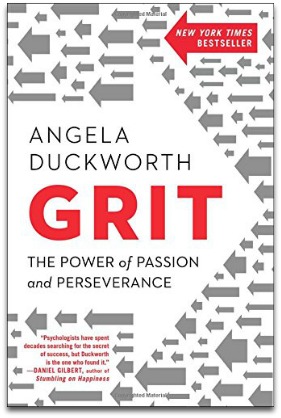 As I write this, the word “grit” has become quite the parenting focal point. Grit is a term that means you know how to stick with something you want despite obstacles and setbacks.
As I write this, the word “grit” has become quite the parenting focal point. Grit is a term that means you know how to stick with something you want despite obstacles and setbacks.
In her book, Grit: The Power of Passion and Perseverance, Angela Duckworth found that grit is also what seems to separate the successful people from the not-so-successful people in life.
So, it’s no wonder we want our children to have it.
Duckworth’s research shows that grit, defined as “a combination of passion and perseverance for a singularly important goal,” is evident in high achievers in every domain. She also discovered scientific evidence that grit can grow.
The truth is, we can’t just give grit to our children. Grit is something a person must earn and develop through experience – mostly through encountering failures that aren’t soul-crushing.
In the process of our children earning their grit, we play a vital role. Our actions – the ways we teach them to talk to themselves, the ways we help them, the ways we let them struggle sometimes – all of those decisions we make along the way either help or hinder grit.
We can’t just tell our children they’re awesome (even though they are). We must let them struggle (with our support) and come out the other side (with our love).
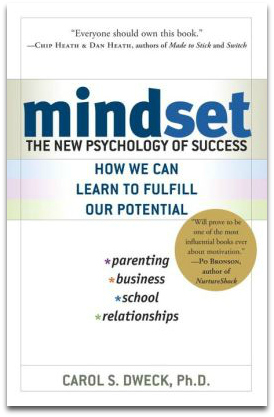 In her book Mindset: The New Psychology of Success, Carol Dweck reports that when a child is praised for effort (“You’re working hard on that!”) instead of perceived fixed factors (“You’re so smart!”) a child is more likely to work hard and achieve more, developing what she calls a “growth mindset.”
In her book Mindset: The New Psychology of Success, Carol Dweck reports that when a child is praised for effort (“You’re working hard on that!”) instead of perceived fixed factors (“You’re so smart!”) a child is more likely to work hard and achieve more, developing what she calls a “growth mindset.”
To get to that growth point, we need to let kids get a little frustrated. The ideal scenario for building grit and confidence is when a task is hard enough, but not too hard.
This differs for everyone, of course, so you have to find the sweet spot for each child.
How we talk to our children absolutely shapes their mindset and ultimately their grit-factor. A cheat-sheet like this one that I created to share with my clients helps get a jump-start on this whole process.
Resilience
Resilience is how we come out of, or recover from, hardship. Resilience is the ability to bounce back and keep going. Resilience is the flexibility we need to adapt to life.
Resilience means we are shaped by our experience – to get nerdy about it, it’s how we demonstrate neuroplasticity.
Briefly, neuroplasticity means our brains are malleable; they change. They don’t grow and then stop changing, even when we reach adulthood. Important to note is that our experiences affect us; our brains actually change as a result of our experiences.
Resilience can be hard to model for your child, especially if you’re someone (like me) who endured a lot of stress as a child and/or has a more intense temperament. When we survive challenges it certainly builds character, but surviving is not the same as resilience.
The American Psychological Association says, “resilience is not a trait that people either have or do not have. It involves behaviors, thoughts and actions that can be learned and developed in anyone.”
I love that! You can learn resilience. One of my favorite tips for teaching (and learning) resilience is a simple self-talk mantra: “I am resilient.”
Here are some examples of rigid vs. resilient self-talk:
Rigid Self-Talk: I’ll never be a good cook.
Resilient Self-Talk: I’m learning how to cook – I’m getting better.Rigid Self-Talk: I just can’t let go of my past.
Resilient Self-Talk: I’m taking steps to heal myself.Rigid Self-Talk: Things are always going to be this way.
Resilient Self-Talk: Things change. I can be patient.
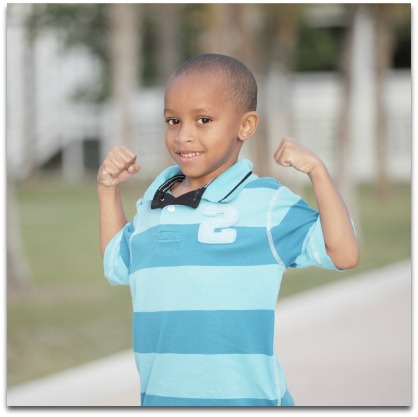 The more we tell ourselves that we possess resilience, the more our brains get the message and we start doing things that actually start to look like resilience – such as figuring out alternative options for when the babysitter calls in sick at the last minute.
The more we tell ourselves that we possess resilience, the more our brains get the message and we start doing things that actually start to look like resilience – such as figuring out alternative options for when the babysitter calls in sick at the last minute.
When we start to model resilience ourselves, our children will start behaving more resiliently as well. For example, when rain cancels our plans to go to the park, my children are now quite adept at saying things like, “Oh, that’s disappointing.” And coming up with “Plan B.”
It was not always this way in my family and it still isn’t 100% foolproof. We all have our off days, for sure. But, in keeping with the mindset of resilience and grit, this is something we continue to work on in our family and it is a value I’ve come to hold dear.
In short, we freak out less. This feels like victory to me. Some days it feels like something worth celebrating – and I do! – especially as my children enter the tween and teen years.
I repeat: it was NOT always this way. We had freak-outs and tears, just like anyone else. It took time to learn how to do it differently – and it still takes time.
We had to work at it. We had to wait to get results. This is how peaceful parenting works. Sometimes there’s a quick fix; sometimes you have to wait to reap what you sow.
I’m here to report, especially to those of you with younger children, that the early years really are the “seed planting” years. The seeds take time to root and sprout and flower and bear fruit.
Remember: we don’t eat the fruit the day we plant the seeds.
I am not perfect, and neither are my children or husband. We strive, though, and in our striving we practice the elements of self-acceptance, grit, and resilience I’ve shared with you.
I sincerely hope this information helps your family begin (or continue) to build your deepest and most confident versions of yourselves. The world needs more grit; less golf-club throwing.
2-Minute Action Plan for Fine Parents
For our quick contemplation today, here are some down-and-dirty tips for putting these ideas into your parenting practice –
Model Self-Acceptance. Use simple phrases such as:
- I’m OK being imperfect
- I learn from my mistakes
- I accept myself as is – and I try to keep growing
Find Optimal Frustration Levels. The ideal scenario for building grit and confidence is when a task is hard enough, but not too hard. This differs for everyone, of course, so you have to find the sweet spot for each child.
Long-Term Action Plan for Fine Parents
This approach requires a new way of speaking and takes time. Journal your journey. Brainstorm new growth mindset phrases you can use with your children. If you don’t know where to start you can use this cheat sheet.
Get honest. Ask yourself how well you accept yourself, what you feel confident about, and how gritty you really are. If you are curious, you can take Angela Duckworth’s Grit Quiz.
Practice resilient self-talk. Developing productive (not just positive) self-talk is a key to positive parenting. The way we talk to ourselves informs how we talk to our children and how they, eventually, will talk to themselves. Self-talk is a huge deal!


Thanks for this helpful post! I struggle with my child giving up too quickly. The tips on teaching grit and resilience sound practical and encouraging. It’s comforting to know other parents face this too.
This is such a relevant topic for so many parents! It’s comforting to know I’m not alone in having a child who sometimes gives up easily. I’m really looking forward to reading your tips on how to teach them grit and resilience. Thanks for tackling this important issue!
This article sounds so relevant! It’s comforting to know I’m not alone with a child who gives up easily. I’m really looking forward to reading about the practical ways to teach them grit and resilience.
Your post is really informative, and the substance is excellent; I’ve read a lot of articles, but yours has made a lasting effect on me; thank you for sharing.
If you are looking for the Grit Sheet you can now find it here: https://bit.ly/grit-download
And if you are searching for more support, please visit me: http://www.LaineLipsky.com
My Very Best,
Laine Lipsky, Parenting Coach
I really need your information.
How can I help you?
You are so welcome – I’m glad it helped!
Your article is very useful, the content is great, I have read a lot of articles, but for your article, it left me a deep impression, thank you for sharing.
What happens when you do all the things you’ve listed and the child still shuts down? My 11 year old boy went from honors to barely passing. He’s emotional and has terrible melt downs recently. I know he cares tremendously about his school grades and his future but he has stopped trying all together. I fear pressure to be accepted by his peers is driving him down. He’s hanging by a thread emotionally. Im at a loss. He’s always been confident, resilient, and motivated until he reached the 6th grade. Please help!
Hi Ashley,
I got your message and feel your frustration! I’d need to hear more about what’s going on to offer any real help.
please email me directly:
hello@lainelipsky.com
I’m sure we can get you feeling better!!
~ Laine
I have read your article, it’s very informative and helpful for me. I admire the valuable information you provide in your articles. Thank you for posting it.
My pleasure! Thanks for the kind note!
I have two children and thanks to apply your useful lessons. The relationship between me and them get better. thank you very much your experience and guide
It’s my honor and pleasure to support your parenting journey!
If you’re looking for more support, please visit my web site: http://www.parentingparachute.com
What about a child that won’t even try? And won’t even try on tasks I know she can do – or at least can do with minimum assistance. For example, getting dressed. She can do it – some days there is no struggle at all she just does it. But most days – she just refuses. I use encouraging words, “Yeah that is hard, and you can work so hard to do it. I can help a little if you want,” etc.
Hi Momnet –
Your comment slipped through my radar, I’m so sorry for this delayed reply!
I’d have to hear more about what’s going on to offer real help. Please email me directly so we can continue the conversation.
hello@lainelipsky.com
Wishing You Awesome Parenting!
Laine
So true that we all need support to thrive!
The most important thing is to simply support and show the child that you believe in him. Support is very important to any adult, and the child is doubly important!
Thank you!
Very good article, I am sure it will be very useful for young parents!
Absolutely! Merely surviving just isn’t good enough. Life’s too short. : )
It’s important to create an environment in which you and your children can truly thrive!
Very good article, I am sure it will be very useful for young parents!
Congratulations Lawrence!
I am honored to support your parenting journey.
And as this group’s motto says, “Great parents are made, not born.”
If you’d like to receive free support, I have two things for you:
1. Free coaching in my Facebook group, The Art of Parenting Well
2. My newest parent-training video, which you can watch here: https://www.parentingparachute.com/replay
Wishing you awesome parenting, Lawrence – please stay in touch.
~ Laine
Having children is the most sacred feeling I’ve ever had. When I heard that small beat, I knew that I was going to be the happiest woman in the world that any woman yearned for. But the journey of nurturing them is much more difficult then I thought. I used to be a bad mother because I didn’t understand my children, always yelled them anytime but I knew I had to change the way I nurse them. Thank you very much for sharing to wake me up to become a better mother.
Dear Ramsha,
I love that you wrote the phrase “wake me up” about being a better parent. I always say that parenting is a wake-up call to become better people … and we get to decide if we’re going to answer that call or not.
If you’d like to receive free support, I have two things for you:
1. Free coaching in my Facebook group, The Art of Parenting Well
https://www.facebook.com/groups/lainelipskyevents/
2. My latest parent-training video, which you can view here: https://www.parentingparachute.com/replay
Wishing you awesome parenting!
: ) Laine
I am pregnant the first adorable baby in my life. Indeed I have a lot of things to learn from the beginning even to understand and how to grow children. Thanks for your any kinds of useful lessons. I will be your loyal reader to learn how to become a good mother.
Congratulations Lawrence!
I am honored to support your parenting journey.
And as this group’s motto says, “Great parents are made, not born.”
If you’d like to receive free support, I have two things for you:
1. Free coaching in my Facebook group, The Art of Parenting Well
2. My latest parent-training video, which you can view here: https://www.parentingparachute.com/replay
Wishing you awesome parenting!
: ) Laine
What about a child that won’t even try? And won’t even try on tasks I know she can do – or at least can do with minimum assistance. For example, getting dressed. She can do it – some days there is no struggle at all she just does it. But most days – she just refuses. I use encouraging words, “Yeah that is hard, and you can work so hard to do it. I can help a little if you want,” etc. But she refuses to even try. She doesn’t want “help,” she wants me to do it completely. Dressing is the most common but she does this with other things too, even with some toys/games. (She is 3 years old).
Hi Kate,
Thanks so much for your question! Three-year-olds, who I affectionately call “three-nagers,” are full of wonder … and often full of strong WILL.
The thing to remember here is that just because she is CAPABLE of doing something, doesn’t mean she is always ABLE.
Depending on many things – including the time of day, her mood, and her brain state – your child will do what she’s able to do at that moment, not what she’s capable of doing at her very best moments.
My suggestion would be to do what you can to make getting dressed something that connects you both, rather than causes a break in your bond. Three-nagers are usually ripe for play to bring them on board. Singing, racing, pretending … these are all great ways to enlist her cooperation.
Please reach out for more support when needed. I’m here and happy to help. The best way to get in touch is through my website: http://www.theparentingprocess.com
Wishing You Awesome Parenting!
~ Laine